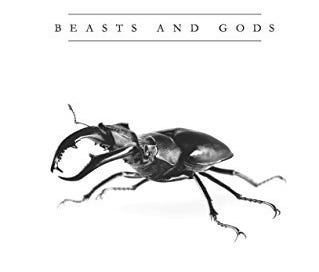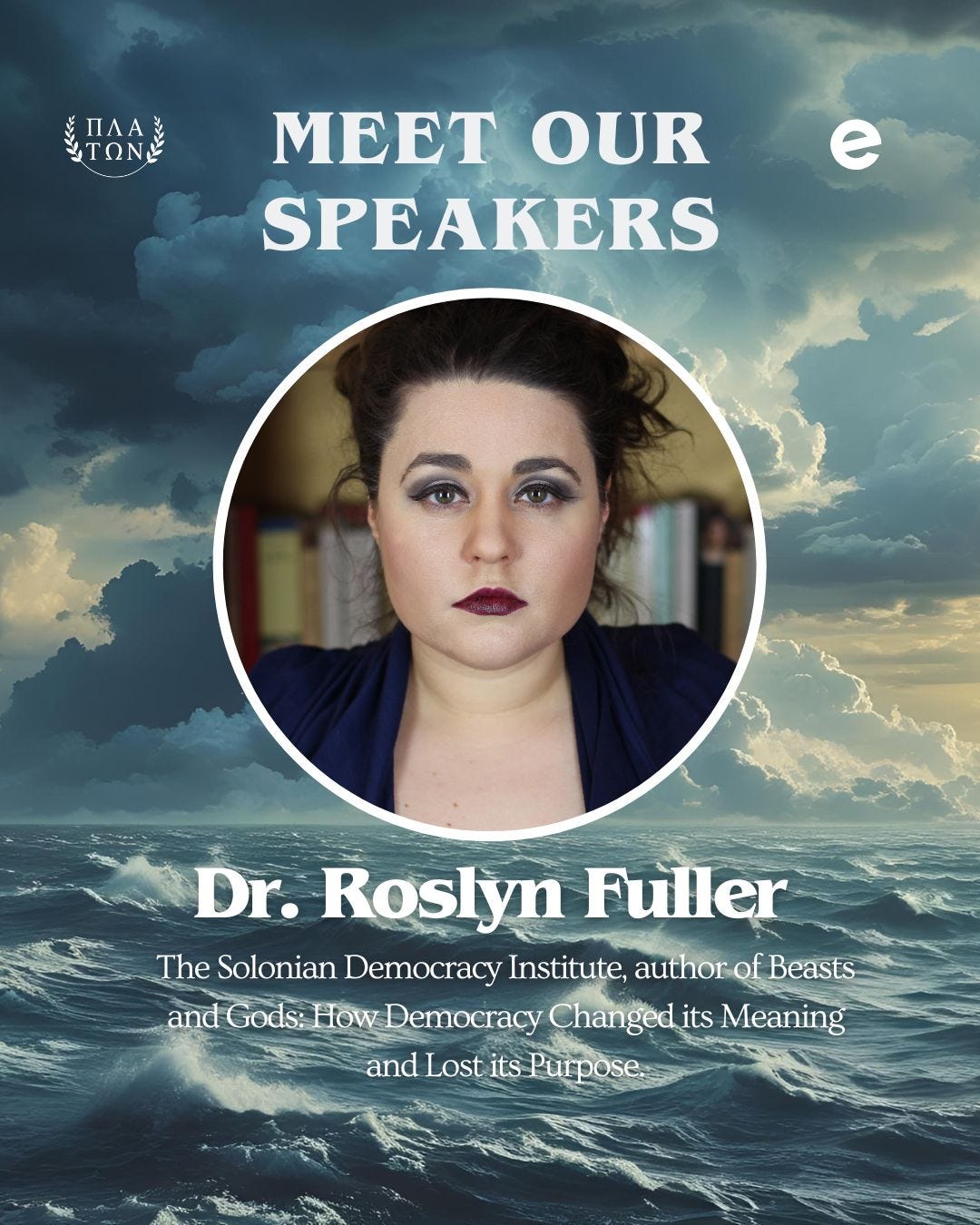Beasts and Gods: How Democracy Changed Its Meaning and Lost Its Purpose
An excerpt from Dr. Roslyn Fuller and Zed Books
PAC would like to extend their deepest thanks to Dr. Roslyn Fuller and Zed Books for this excerpt from Beasts and Gods: How Democracy Changed Its Meaning and Lost Its Purpose.
Dr. Fuller is one of our esteemed speakers at our upcoming virtual event Democracy and Tyranny, Saturday July 26 at 1 pm EDT.
Beasts and Gods: How Democracy Changed Its Meaning and Lost Its Purpose
(Zed/Bloomsbury, 2015), Roslyn Fuller
Shortlisted for the Eric Hoffer Award Grand Prize
The ancient city-state of Athens is often credited with being the birthplace of democracy. Although democracy was also practised in other Greek states, the political structure of Athens has been the subject of the most study as well as some of the best-preserved records written by people who personally experienced it. These people woke up every morning and went to bed every night under democracy; they witnessed some of the most dramatic moments of history with their own eyes, and were personally involved in the important decisions of Athenian political life. The writings of these ancient political observers are almost like time capsules, delivering information about their society far into the future in a way that those alive at the time could probably never have imagined possible. And in their turn, they tell us about an ancient system of government that is equally hard for us to imagine today. It may have shared the name ‘democracy’ with our own, but it used vastly different methods of governance. So different, in fact, that they call many of our own ostensibly democratic traditions into question. To understand just how profound these differences were, it’s necessary to know a bit about the culture that came up with them.
When we look at the classical marble statuary of Greek civilization in museums, we often get an impression of solemn formality, but when they were created, these statues were often painted, brightly coloured masterpieces not of grave reverence, but of passion, wisdom and power. After all, the ancient Athenians lived in the dynamic atmosphere of one of the most powerful and developed cities on earth. Feats of engineering, chariot racing and risqué theatre productions – Athens had something for everyone. The philosophers who lived, studied and congregated in this city of ideas were already hypothesizing that the world was round, that the sun was a ball of fire, and that all matter was constructed from building blocks too small to see that they christened ‘atoms’ – all far-sighted theories that would not be conclusively proved for millennia. But what really distinguished Athens from other important cities of the time was that its citizens aspired to the good life. Socializing, satisfying meals, beautiful things, and a break from hard labour – this cultivated prosperity was what made life worth living. In this sense, the Athenians shared values with many people living in Western societies today.
But there were also important differences. At the time that the Athenian navy dominated the Aegean Sea, its architects designed the Acropolis and philosophers like Plato founded schools of thought that would influence human reasoning for thousands of years, no one really thought that democracy was a good thing unto itself or that people had an inherent right to live under this kind of government. In fact, many of the greatest thinkers of the time were convinced that other forms of rule, such as oligarchy or aristocracy, were superior to democracy. Even important and respected nations like Sparta and Rome were positively proud of their undemocratic way of life. Their citizens and rulers did not hesitate to disparage the very idea of democracy or boast that their own political practices were far more advanced precisely because they did not give ‘the common people’ any say in government. Democracy, in short, was not at all fashionable, and no one felt compelled to pretend that they lived in a democracy.
And in the absence of pretence, it was easier to get absolute clarity on what democracy was. It was measured on one thing only: who held political power? To the ancient Greeks, this was the bottom line in defining political organization, and it is reflected in the names they gave to each form of government. To us, words like ‘oligarchy’ or ‘democracy’ may sound like technical terms, but they are really just straightforward Greek descriptions of how government decisions are taken. In ancient Greek demos means ‘people’ (in the sense of the people of a nation), while kratos means ‘power’. Demos + kratos (demokratia in ancient Greek) means ‘people power’. By the same token oligos means ‘few’, while arches means ‘rule’. Oligarchy therefore means ‘rule by the few’. So, when the Athenians spoke to each other in what they would have considered to be plain Greek, they literally said, ‘so here we are in a people power [state]’ or ‘yes, of course, Sparta is a rule by the few [state]’.
This is significant, because it meant that the ancient Greeks did not confuse the means via which decisions were made (e.g. by one person, a few people, or everyone) with the end they were trying to achieve (e.g. a well-run economy, sound foreign policy, etc). The Athenians would not have seen ‘elections’ or ‘human rights’ or ‘economic prosperity’ as signs that a nation was a democracy. Democracy simply meant ‘people power’. How the people of a nation acquired that power and what they did with it were separate issues. By the same token, oligarchy did not necessarily mean ‘oppression’ or ‘human rights abuses’. It simply meant ‘rule by the few’. Whether those few were benevolent or not was another question entirely. Therefore, no matter how impressive a state’s achievements might be, it could only qualify as a democracy if political power genuinely resided in the hands of the people, if they, and no one else, made all decisions.
While modern Western democracies are often accused of failing to deliver power to the people (a well-founded accusation, as we will see in the following chapters), Athenian democracy unarguably achieved this goal. Perhaps even more importantly, while the Athenians did not associate other goals, such as an impartial justice system, lack of corruption or real equality between citizens, with democracy in the same explicit way that we do today, their form of government did a much better job of actually delivering these goods than ours does.
So how did they do it?
This is what the remains of this chapter will investigate.
Dr. Roslyn Fuller is a political philosopher, former university lecturer, and an expert on electoral systems, historical democracy and digital democracy who now heads the Dublin-based Solonian Democracy Institute. The author of five books, including the Orwell Prize-nominated Beasts and Gods: How Democracy Changed Its Meaning and Lost Its Purpose (Zed Books, 2015) and In Defence of Democracy (Polity, 2019), Roslyn frequently contributes to print, radio and broadcast media (BBC, Forbes, The Nation, Los Angeles Review of Books, etc.) on issues relating to democracy as well as to international law. Born in Canada, she wrote her bar exams with a specialization in public international law in Lower Saxony, Germany before moving to Ireland to write her PhD at Trinity College, Dublin.








Hi Roslyn, I interviewed Paul Cartledge a few months ago. Think you would find it interesting. Lots of similar themes. I’ve also been looking at democracy recently from an AI perspective. Sid a recent course at LSE. Some alarming things cropping up but some rays of hope. It would be useful to have ostracism to Mars at our disposal today.